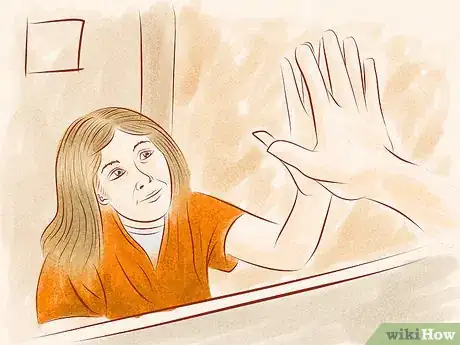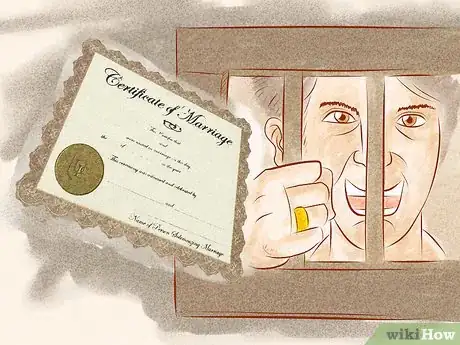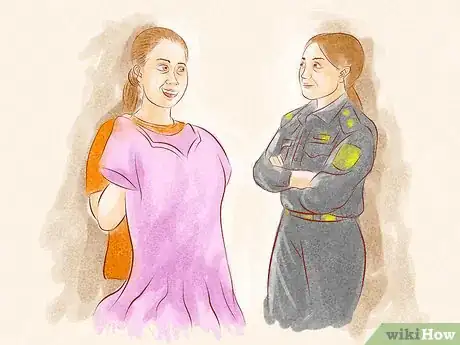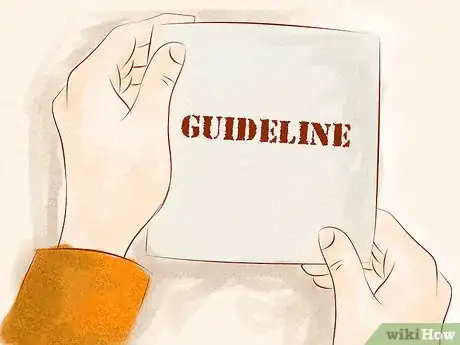This article was co-authored by Clinton M. Sandvick, JD, PhD. Clinton M. Sandvick worked as a civil litigator in California for over 7 years. He received his JD from the University of Wisconsin-Madison in 1998 and his PhD in American History from the University of Oregon in 2013.
wikiHow marks an article as reader-approved once it receives enough positive feedback. This article has 13 testimonials from our readers, earning it our reader-approved status.
This article has been viewed 198,293 times.
In most cases, marrying someone in prison is discouraged. Prison marriages fail at an even higher rate than other marriages. That being said, there are reasons why people get married to prisoners, including to facilitate the care and adoption of children. This article will briefly discuss some unique challenges to anticipate when marrying a prisoner.
Steps
Deciding to Marry
-
1Think about timing. There are a variety of factors that go into choosing when to get married. Some of them involve children or financial benefits. When marrying a prisoner, you must also consider the potential release date.[1]
- If the release date is soon, you and your spouse will be dealing with the challenges of two major transitions at the same time
- If the release date is far off, you and your spouse can adjust to being married and then to the release
- Regardless of the release date, think about whether it may be best to wait until after you and your potential spouse adjust to release before getting married
-
2Learn the prison rules. Each prison has its own rules concerning marriage. Talk with the prison chaplain, warden or other appropriate official to learn the rules and policies of your finance’s particular prison. Some policies include:
- Not all prisons allow inmates to marry
- Some particular inmates are not allowed to marry
- Some require the prison chaplain officiate
- Many prisons do not allow conjugal or extended visits after the ceremony
Advertisement -
3Obtain counseling. You and your fiancé should seek counseling regarding your marriage, both separately and together. Some prisons require this prior to allowing an inmate to marry. Further, counseling will likely be beneficial after the prisoner’s release. Keep in mind that prison marriages have an even higher failure rate than marriages in which incarceration is not a factor.
Arranging the Wedding
-
1Complete any paperwork required by the prison. Many prisons require a packet of paperwork to be completed by both potential spouses before granting permission for the wedding to take place. Check with the warden or other appropriate prison official to learn how to submit your application, if necessary. Some common paperwork requirements include:[2]
- Proof that both potential spouses are of legal age to marry
- Statements that the marriage is entered into willingly
- Statements regarding the reason the wedding is requested while one potential spouse is incarcerated
-
2Set a date. Unlike in a traditional wedding setting, the prison likely sets strict guidelines about when weddings can and cannot occur. You will need to consider these guidelines when setting your date.[3]
- Some facilities only allow group weddings on certain days of each year.
- Some facilities do not allow weddings on weekends.
-
3Get a license. Every state requires potential spouses to obtain a marriage license prior to becoming legally married. This requirement is not waived because one potential spouse is in prison. Contact the warden or other appropriate official of the prison in which the inmate is housed to learn the process for obtaining this license. Often, the non-incarcerated potential spouse will be tasked with this.[4]
-
4Locate an officiant. In many prisons, you will not have a choice of officiant because the prison will only allow the prison chaplain to officiate weddings. If you can and want to use your own officiant, some things to consider are:
- The cost the officiant will charge, including any additional costs for travel to and from the prison
- Whether the officiant is willing to undergo the security measures required by the prison
- Some prisons maintain a roster of approved officiants
- Whether the officiant will be allowed to wear any ceremonial garb, such as robes
-
5Arrange for guests. Not all prisons allow guests to attend weddings. For witnesses, they require you to use prison officials or other inmates. If your prison allows guests, you want to consider:[5]
- Any limits the prison may set on the number of guests
- Any requirements the prison has for approving the individual guests (such as background checks, etc)
- Any clothing restrictions that will apply to guests when entering the prison
Getting Married
-
1Be aware of the clothing restrictions. As with guests and the officiant, there will likely be clothing restrictions for the marrying couple. The inmate will likely be required to wear a prison jumpsuit. The spouse coming in should be aware of any restrictions on clothing. This may require that you forego a tuxedo or formal gown. Some clothing restrictions include:[6]
- Many prisons restrict revealing clothing, such as low-cut necklines, spaghetti (or no) straps, exposed waistlines, etc.
- Many prisons restrict clothing with multiple places for storing contraband, such as cummerbunds and multi-paneled, train-length and/or flowing skirts
- Many clothing decorations are likely to set off the metal detector, such as metallic sequins or beads, jewelry, and certain inserts in high-heeled shoes
-
2Leave contraband at home. Talk with the warden or other appropriate prison official for a list of what items may not be brought into the prison for the ceremony. Frequently, items that cannot enter the prison include:
- Cameras
- Cell phones
- Pagers
- Outside food (such as a wedding cake)
-
3Follow the prison’s guidelines. Prison officials will likely be standing by during your ceremony to ensure that no rules are broken, but it is best to talk to the officials to know what is and is not allowed. For instance, prior to the ceremony, you should determine whether there are restrictions on physical contact that will impact whether and how you can kiss once the officiant pronounces you married.
References
- ↑ http://articles.chicagotribune.com/2011-12-21/news/ct-x-1221-prison-wives-20111221_1_prison-marriages-melissa-sanders-rivera-stateville-correctional-center
- ↑ http://www.michigan.gov/corrections/0,4551,7-119-9741_12798-228401--,00.html
- ↑ http://articles.chicagotribune.com/2011-12-21/news/ct-x-1221-prison-wives-20111221_1_prison-marriages-melissa-sanders-rivera-stateville-correctional-center/2
- ↑ http://www.doc.state.al.us/docs/AdminRegs/AR407.pdf
- ↑ http://www.latimes.com/local/lanow/la-me-ln-charles-manson-marriage-20141117-story.html
- ↑ http://articles.latimes.com/1996-10-18/news/mn-55203_1_prison-wedding
About This Article
If you want to marry someone in prison, you’ll need to familiarize yourself with the prison’s marriage rules and adapt your plans to comply with them. First, find out if the prison your partner is in allows marriages, since some do not. If the prison allows marriages, ask the warden about any paperwork you need to complete, and apply for a marriage license from your state. Keep in mind that your choice of officiant will likely be restricted, because many prisons only allow the prison chaplain to perform the marriage. When you’re preparing your outfit for your big day, remember that clothing restrictions often apply, which means you may not be able to wear a full gown or tuxedo. Additionally, avoid taking items to your ceremony that may be prohibited, like cameras or cell phones. For tips from our Legal co-author on how to decide if getting married in prison is a good idea, read on!









































































